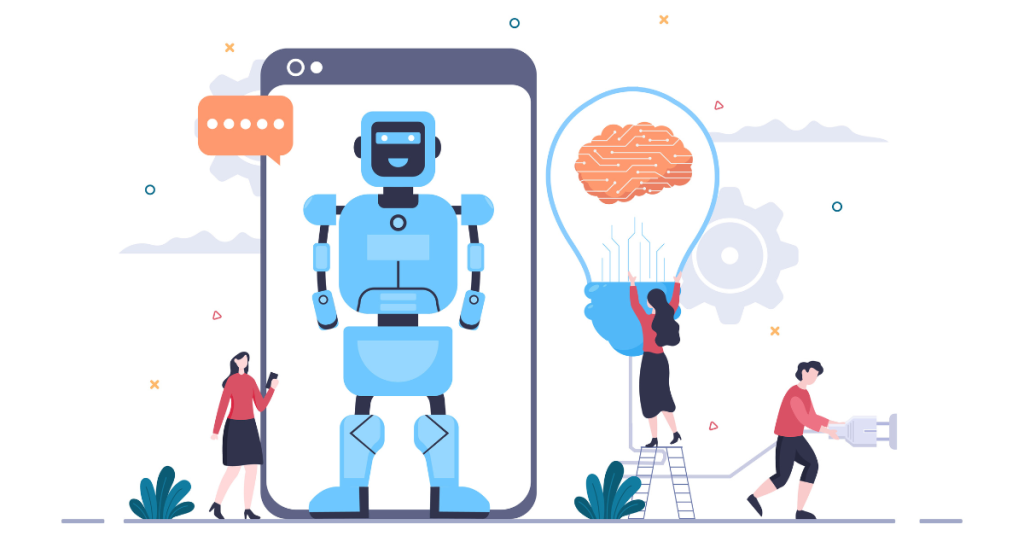
User Review
( votes)Artificial intelligence is changing how businesses work, including improving sales. AI helps companies understand customer behavior, customize marketing, and simplify sales. It allows businesses to examine large amounts of data to predict customer preferences and improve pricing strategies. This article will look at how AI is changing the sales industry, giving businesses the tools to boost revenue and profit.
What Is Artificial Intelligence?
Artificial intelligence (AI) is when machines are made to do things that usually need human intelligence, like understanding what they see, making decisions, and translating languages.
In sales, AI can change how things are done by doing repetitive tasks automatically, looking at customer data to find patterns and things they like, and giving sales teams immediate information. This helps by personalizing product suggestions, guessing what customers might do, and making the whole customer experience better.
Using AI in sales also has good things like making things faster, knowing which leads are best, and guessing sales more accurately. Basically, AI gives sales teams the chance to work better, not just harder, by using tech to make things smoother and get better results.
How AI Transforms Sales Processes
Artificial intelligence has transformed sales processes. It has greatly improved their efficiency and effectiveness. AI uses advanced data analysis to identify patterns and trends in customer behavior. This helps sales teams make more accurate predictions and targeted offers. Consequently, conversion rates and revenue increased. Integrating AI into sales teams has additional benefits.
It streamlines lead generation, automates routine tasks, and provides personalized recommendations based on individual customer preferences. AI-powered chatbots and virtual assistants can also improve customer relationships. They provide 24/7 support, address inquiries in real time, and deliver tailored product information. Leveraging AI technology enables sales teams to foster stronger customer interactions, drive sales growth, and enhance sales performance through more precise forecasting and improved customer satisfaction.
Exploring GenAI: The Future of Sales

GenAI Defined
In sales and marketing, GenAI uses AI technology to improve sales processes. It analyzes customer data, automates responses, and optimizes sales.
Compared to traditional methods, GenAI can interact with more customers, adapt to individual needs, and gather data faster.
Using GenAI in sales teams can lead to better lead generation, higher conversion rates, faster response times, and more accurate sales forecasts.
It also frees up reps’ time for important tasks like building relationships and closing deals, boosting team productivity.
Benefits of GenAI for Sales Teams
GenAI offers several benefits to sales teams.
For example, it can enhance productivity and efficiency by automating tasks such as data entry, lead scoring, and email outreach. This frees up sales representatives to focus on building relationships with potential customers and closing deals.
Use Cases of Artificial Intelligence for Sales

Lead Scoring
Lead scoring helps sales teams work more efficiently. It lets them focus on leads that are more likely to become customers. GenAI uses artificial intelligence to analyze and rank potential leads. It looks at factors like demographics, online behavior, and engagement with previous marketing efforts. Predictive analysis is key in lead scoring. It uses data to predict which leads are most likely to result in a successful sale. This helps sales teams use their time and resources more effectively.
As a result, conversion rates and revenue go up. Lead scoring also helps with personalized marketing at scale. It lets companies tailor their messaging and content to specific leads based on their behaviors and interests. This personalization can make marketing efforts more impactful and relevant, leading to higher engagement and customer acquisition.
Predictive Analysis
Predictive analysis uses artificial intelligence to anticipate future outcomes based on historical data. In sales, GenAI enables businesses to identify potential customers, forecast buying behaviors, and optimize pricing strategies.
The benefits of using predictive analytics in sales include:
- Improved lead scoring accuracy
- Increased conversion rates
- Reduced customer churn
Successful use cases of predictive analysis in sales:
- Lead generation, where AI algorithms analyze customer data to identify high-potential leads
- Customer segmentation, tailoring marketing strategies to specific customer groups, and more targeted and effective sales efforts
Personalized Marketing at Scale
Artificial intelligence is a powerful tool for achieving personalized marketing at scale, especially in the context of sales.
Using AI, sales teams can analyze large sets of customer data to identify trends and patterns. This allows them to tailor their marketing efforts to individual preferences and behaviors.
This level of personalization leads to higher engagement and conversion rates. It also enhances the overall customer experience.
By leveraging AI, sales teams can automate the process of delivering personalized content and recommendations to each customer. This leads to more efficient and effective marketing campaigns.
Successful use cases of AI for personalized marketing at scale in sales can be seen in the form of:
- Predictive lead scoring
- Dynamic content generation
- Real-time customer segmentation
These applications have not only resulted in increased sales but also in improved customer satisfaction and loyalty.
AI’s ability to process and interpret data at scale makes it a valuable asset for sales teams looking to enhance their marketing efforts and engage with customers on a more personal level.
Chatbots for Customer Support

Chatbots for customer support have many benefits, like being available 24/7, giving instant responses, and handling multiple inquiries at once. GenAI’s chatbots are trained to understand and respond to customer questions quickly, reducing wait times and improving the overall support experience. Thanks to advancements in artificial intelligence, chatbots can give personalized recommendations, troubleshoot technical issues, and guide users through the buying process.
These abilities have been successfully used in e-commerce, banking, and healthcare, where chatbots have reduced response times, increased customer satisfaction, and helped companies save on costs.
For example, in retail, chatbots can help with product recommendations and order tracking, while in healthcare, they can schedule appointments and provide basic medical advice. The flexibility and scalability of chatbots have transformed how businesses interact with their customers.
Improving Marketing with Artificial Intelligence
AI-Powered Marketing Strategies
AI-Powered Marketing Strategies use artificial intelligence to personalize the customer experience based on preferences and behaviors. This includes personalized product recommendations and targeted email campaigns to boost customer engagement.
AI also improves lead scoring and predictive analysis in sales by identifying high-quality leads and predicting customer behaviors. This leads to increased conversion rates and more efficient sales efforts.
Furthermore, AI analyzes large datasets to uncover insights and trends, leading to more informed decision-making and sales growth. For instance, AI identifies the most effective channels and messaging for specific audiences to optimize marketing efforts and generate increased revenue.
Driving Engagement Through Personalization
Personalization in sales and marketing is about tailoring content and communications to each customer’s needs and preferences. This means using data to understand their past interactions and purchase history, and then creating personalized recommendations and offers.
Artificial intelligence helps with this by analyzing large amounts of data to predict future behavior. For instance, GenAI uses machine learning to analyze customer data and offer personalized product recommendations in real-time, leading to increased customer engagement and sales.
Successful examples of personalized engagement include targeted email campaigns that address customers by name and offer products based on their recent browsing history, resulting in higher open and conversion rates. Personalized retargeting ads on social media and websites also drive engagement by showing customers products they have previously shown interest in.
CMO Insights on AI Adoption
CMOs have found that adopting AI in sales brings many benefits. This includes better lead scoring and forecasting accuracy, improved customer segmentation, and more personalized experiences for customers. AI helps CMOs analyze large amounts of customer data to spot trends, shape marketing strategies, target ads better, and boost customer engagement. CMOs have also seen how AI adoption impacts sales growth, leading to improved productivity and efficiency.
Boosting Sales Rep Productivity with AI

Sales Rep CoPilot Explained
Sales Rep CoPilot uses artificial intelligence to improve sales productivity. It gives real-time recommendations and insights to sales reps by analyzing customer interactions, emails, and other data sources. The tool learns from successful sales interactions, identifying patterns that lead to positive outcomes. This allows sales reps to apply these insights in their current client interactions.
Integrating Sales Rep CoPilot can bring benefits like increased efficiency, personalized customer interactions, and higher sales conversion rates. It also automates repetitive tasks, allowing sales reps to focus on building relationships with clients and finding new business opportunities.
Automating Routine Sales Tasks
Automating routine sales tasks using artificial intelligence has several benefits. It increases productivity, efficiency, and accuracy. AI-powered tools allow sales reps to focus on important activities like building client relationships and making strategic decisions.
For instance, GenAI can analyze data to provide insights for prioritizing leads, personalizing outreach, and forecasting revenue. This streamlines the sales process, leading to higher conversion rates and customer satisfaction.
AI in sales automation includes lead scoring, which helps identify qualified leads quickly, and chatbots that handle routine customer inquiries. These examples show how AI makes sales processes more efficient, ultimately driving revenue and business growth.
Learning from Early Adopters of Artificial Intelligence for Sales
Success Stories by Industry Leaders
Industry leaders have successfully used artificial intelligence in their sales processes. They do this by using strategies like predictive analytics, lead scoring, and dynamic pricing. These tactics help sales teams find potential customers, prioritize leads, and optimize pricing for maximum profit.
Artificial intelligence has helped these leaders’ sales teams grow by giving real-time insights, automating tasks, and enabling personalized customer interactions. Early adopters of AI in sales have learned important lessons, like the need for accurate data, continuous training, and improved sales forecasting.
These insights are paving the way for future advancements and innovations in AI for sales.
Impact on Sales Growth
Artificial intelligence has had a big impact on sales growth. Companies using AI have seen better lead generation, customer segmentation, and personalized marketing. AI has helped increase customer engagement, improve sales forecasting accuracy, and streamline the sales process. It has allowed sales teams to focus on promising leads, leading to higher conversion rates and revenue growth.
These changes have not only helped individual companies but have also influenced the whole industry, emphasizing data-driven decision-making and analytics in sales strategies.
Key takeaways
Artificial intelligence can boost sales. It helps businesses understand customer behavior, personalize marketing, and streamline sales. AI analyzes data to find patterns and trends, leading to more effective strategies. AI-powered chatbots provide instant customer support, enhancing their experience and potentially increasing sales. Integrating AI into sales processes can improve efficiency, increase revenue, and enhance customer satisfaction.







